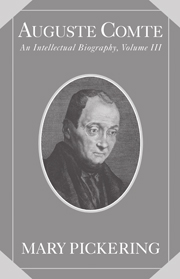Book contents
- Frontmatter
- Contents
- Acknowledgments
- Abbreviations and Notes
- Introduction
- 1 The Coup d'Etat and Its Consequences
- 2 Comte's Stumblings
- 3 The Vicissitudes of Positivism during the Early Empire
- 4 Système de politique positive: Natural and Social Philosophy
- 5 Système de politique positive: Comte's Philosophy of History
- 6 Système de politique positive: Comte's Utopia
- 7 The Last Years: Politics and Propaganda
- 8 The Last Flurry of Activity: The Testament and Synthèse subjective
- 9 The Death of the Great Priest of Humanity and His Influence
- Conclusion
- Bibliography
- Index
- References
1 - The Coup d'Etat and Its Consequences
Published online by Cambridge University Press: 06 January 2010
- Frontmatter
- Contents
- Acknowledgments
- Abbreviations and Notes
- Introduction
- 1 The Coup d'Etat and Its Consequences
- 2 Comte's Stumblings
- 3 The Vicissitudes of Positivism during the Early Empire
- 4 Système de politique positive: Natural and Social Philosophy
- 5 Système de politique positive: Comte's Philosophy of History
- 6 Système de politique positive: Comte's Utopia
- 7 The Last Years: Politics and Propaganda
- 8 The Last Flurry of Activity: The Testament and Synthèse subjective
- 9 The Death of the Great Priest of Humanity and His Influence
- Conclusion
- Bibliography
- Index
- References
Summary
The unexpected coming of a true temporal dictatorship alters very happily our republican situation and consequently the entire Occidental situation.
Auguste Comte to Benedetto Profumo, December 26, 1851COUP D'ETAT AND THE SECOND EMPIRE
Like many others in France, Comte seemed to be increasingly worried about the political situation as chaos worsened after the Revolution of 1848 and the elections for the Assembly and the presidency approached in 1852. He imagined that the increasing anarchy weakened the central power, while the Assembly became more omnipotent as it governed by legislative committees. He hoped that the Parisian workers would be disabused of their “last metaphysical illusion,” that of the importance of representative government, and that they would dismiss the Assembly with the “tacit approval of the provinces.” Positivism could profit by presenting itself as the “unique refuge” of people worried about the family and property, which were “menaced by all the metaphysical tendencies” and “compromised by theological obstructions.”
To be ready for power being dropped in the positivists' laps, Comte began to plan how they should rule France. He developed his ideas during meetings of the Positivist Society. In 1850, he asked Emile Littré to head a committee composed of himself, Pierre Laffitte, and Jean-Fabien Magnin to write another position paper to encapsulate these ideas. Littré, a famous scholar and journalist, was Comte's leading French disciple. Laffitte was a young mathematician and one of Comte's closest companions. Magnin was Comte's principal working-class disciple.
- Type
- Chapter
- Information
- Auguste ComteAn Intellectual Biography, pp. 14 - 52Publisher: Cambridge University PressPrint publication year: 2009



